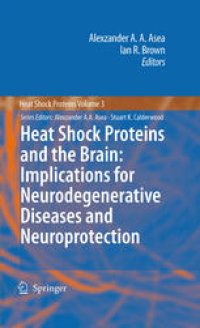
Ebook: Heat Shock Proteins and the Brain: Implications for Neurodegenerative Diseases and Neuroprotection
- Tags: Neurosciences, Molecular Medicine, Laboratory Medicine, Human Physiology, Pharmacology/Toxicology
- Series: Heat Shock Proteins 3
- Year: 2008
- Publisher: Springer Netherlands
- Edition: 1
- Language: English
- pdf
With the prevalence of neurodegenerative diseases on the rise as average life expectancy increases, the hunt for effective treatments and preventive measures for these disorders is a pressing challenge. Neurodegenerative disorders such as Alzheimer’s disease, Huntington’s disease, Parkinson’s disease and amyotrophic lateral sclerosis have been termed ‘protein misfolding disorders’ that are char- terized by the neural accumulation of protein aggregates. Manipulation of the cellular stress response involving the induction of heat shock proteins offers a the- peutic strategy to counter conformational changes in neural proteins that trigger pathogenic cascades resulting in neurodegenerative diseases. Heat shock proteins are protein repair agents that provide a line of defense against misfolded, aggregati- prone proteins. Heat Shock Proteins and the Brain: Implications for Neurodegenerative Diseases and Neuroprotection reviews current progress on neural heat shock proteins (HSP) in relation to neurodegenerative diseases (Part I), neuroprotection (Part II), ext- cellular HSP (Part III) and aging and control of life span (Part IV). Key basic and clinical research laboratories from major universities and hospitals around the world contribute chapters that review present research activity and importantly project the field into the future. The book is a must read for researchers, postdoctoral fellows and graduate students in the fields of Neuroscience, Neurodegenerative Diseases, Molecular Medicine, Aging, Physiology, Pharmacology and Pathology.
With the prevalence of neurodegenerative diseases on the rise as average life expectancy increases, the hunt for effective treatments and preventive measures for these disorders is a pressing challenge. Neurodegenerative disorders such as Alzheimer's disease, Parkinson's disease and amyotrophic lateral sclerosis have been termed 'protein misfolding disorders' that are characterized by the neural accumulation of protein aggregates. Manipulation of the cellular stress response involving the induction of heat shock proteins offers a therapeutic strategy to counter conformational changes in neural proteins that trigger pathogenic cascades resulting in neurodegenerative diseases. Heat shock proteins are protein repair agents that provide a line of defense against misfolded, aggregation-prone proteins. This book reviews current progress on heat shock proteins in the brain and their implications for neurodegenerative diseases, neuroprotection, aging and control of life span. Key laboratories from major universities around the world contribute chapters that review present research activity and project the field into the future.